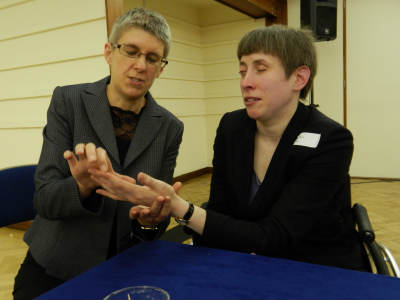
Over the coming months, the regulations and guidance surrounding the Care Bill will begin to take shape, setting out how this most important piece of legislation will affect day-to-day practice. The government has committed to providing specialist assessments of need for disabled people who require them, including the deafblind people that Sense supports, but the wording of the regulation has yet to be agreed.
Access to an appropriate specialist assessment is vital for people with dual sensory loss and without this the resulting social care package is often completely ineffective. For example, an older person Sense supported was assessed by three specialists in the areas of hearing loss, sight loss and older people. She was given a hearing loop to allow her to watch TV but the instructions were too small for her to read, a cane but she couldn’t hear traffic so it wasn’t safe for her to use, and was sent to a day centre where she became even more isolated as it was very loud and no one could communicate with her.
Ineffective support
None of these errors was the individual practitioner’s fault – they were providing the support and advice they were trained to give. But without a full understanding of multiple sensory impairments the support given was totally ineffective and essentially a complete waste of money.
The regulations must acknowledge the need for truly specialist assessments. Deafblindness isn’t just a case of needing an expert who understands hearing impairments and one who understands visual impairments; it needs to be someone who understands both and the impact they have on one another. For example, practitioners must understand how to provide information in an accessible way to the service user who is both deaf and blind.
In addition, there is a huge range of technology available for people with sensory impairments, and understanding what is on offer is key to being able to recommend the appropriate support. Those carrying out the assessments must fully understand the impact that being deafblind has on someone’s life and be able to identify how best to support them.
It is very important that we see explicit mentions of specialist support in the regulations, extending on what is currently outlined in the statutory guidance on social care for deafblind people, published in 2009. Currently, the guidance states that assessment of a deafblind person should only be undertaken by “a specifically trained experienced person/team equipped to assess the needs of a deafblind person – including communication, one-to-one human contact, social interaction and emotional wellbeing, support with mobility, assistive technology and rehabilitation”.
The deafblind guidance does not specify what constitutes ‘specifically trained and equipped’. Yet any social care assessment of a deafblind person that does not take proper account of the guidance can be challenged, ultimately in court.
Specialist qualifications
There are a range of qualifications available to practitioners who are responsible for providing specialist assessments to deafblind people, such as the certificate and diploma in deafblind studies developed by Sense, Sense Scotland, Deafblind UK, RNIB, Deafblind Scotland and Signature. This is a two-year part-time course of study leading to qualifications that are credit-rated by the Open University and which are recognised across the UK. This is just one example of some of the courses out there to help train practitioners in this area and the length of the course reflects the depth of the knowledge required.
This week in Parliament a group of deafblind people came to share their experiences of social care with their local MP and to highlight the importance of these assessments. As the Care Bill enters the House of Commons, I hope MPs will take on board what they have heard in deciding on the regulations for the Care Bill – both for the benefit of deafblind people and for the practitioners delivering the assessments. Currently there are 220,000 older people in the UK with combined sight and hearing loss. However, this number is predicted to double over the next 20 years, rising to 418,000 over the age of 70 by 2030.
Find out more
Sue Brown is head of campaigns and public policy at national deafblind charity Sense


 Assistive technology and dementia: practice tips
Assistive technology and dementia: practice tips  A trauma-informed approach to social work: practice tips
A trauma-informed approach to social work: practice tips 




 Find out how to develop your emotional resilience with our free downloadable guide
Find out how to develop your emotional resilience with our free downloadable guide  Develop your social work career with Community Care’s Careers and Training Guide
Develop your social work career with Community Care’s Careers and Training Guide  ‘Dear Sajid Javid: please end the inappropriate detention of autistic people and those with learning disabilities’
‘Dear Sajid Javid: please end the inappropriate detention of autistic people and those with learning disabilities’ Ofsted calls for power to scrutinise children’s home groups
Ofsted calls for power to scrutinise children’s home groups Seven in eight commissioners paying below ‘minimum rate for home care’
Seven in eight commissioners paying below ‘minimum rate for home care’
 Facebook
Facebook X
X LinkedIn
LinkedIn Instagram
Instagram
Comments are closed.